Back in 2006, Michael Dell told me that Dell was going to be the first major PC vendor to release and support desktop Linux. Six years after that, Dell went further. The Austin, Texas-based company released a laptop specifically for Linux and open-source developers: The Project Sputnik Dell XPS13. A decade later, Dell is still producing this popular programmers-first laptop.
From the start, this powerhouse laptop family's path forward has been shepherded by Barton George, Dell Technologies' Developer Community manager. I've also been using and reviewing the Dell XPS13 Developer Edition since day one. They were great machines then. They're great machines now.
Of course, as George and I discussed in a recent interview, Dell wasn't interested in a niche developer laptop. Then, and now, Dell has been largely about high-volume PCs and laptops. Still, the idea, which had been sparked by a conversation between Dell and Stephen O'Grady, co-founder of the developer-centric analyst firm, RedMonk, never quite went out.
So, when Dell started an innovation fund, George and friends gave it a shot. This time they were successful.
Having done this, the Sputnik team wanted to ensure they did it right. This wouldn't just be a case of dumping a distro on a machine and hoping for the best. You can do that today and have an excellent chance of everything working perfectly. In 2012? Not so much.
So, Dell got together with Canonical, Ubuntu Linux's parent company, to make sure all the drivers were in place for a top-notch Ubuntu Linux developer desktop experience. Indeed, Project Sputnik is a nod to Ubuntu founder, and Canonical CEO, Mark Shuttleworth. A decade before the project itself, Shuttleworth had spent eight days orbiting the earth in a Soviet Soyuz. Dell decided "Soyuz" didn’t have an inspiring ring to it, so the company went with “Sputnik” instead.
Since then, the XPS 13 has evolved into a portfolio of developer systems, including the Linux-based Precision mobile and fixed workstations, catering not only to developers but data scientists as well.
Today, Dell supports Linux throughout its hardware line. The Dell XPS13 Developer Edition, which is up to the 12th generation, continues to be an outstanding programming laptop. It will continue to do so for the foreseeable future.
Since then, the XPS 13 has evolved into a portfolio of developer systems, including the Linux-based Precision mobile and fixed workstations, catering not only to developers but data scientists as well.
Today, Dell supports Linux throughout its hardware line. The Dell XPS13 Developer Edition, which is up to the 12th generation, continues to be an outstanding programming laptop. It will continue to do so for the foreseeable future.
But, George is looking forward to bigger, better things for developers. "Dell is looking at various ways to broaden the portfolio on the client side. The team is currently in the early stages of brainstorming and are looking at a variety of options, so please stay tuned!" I'll be looking forward to it!
Other noteworthy Linux and open-source stories:


